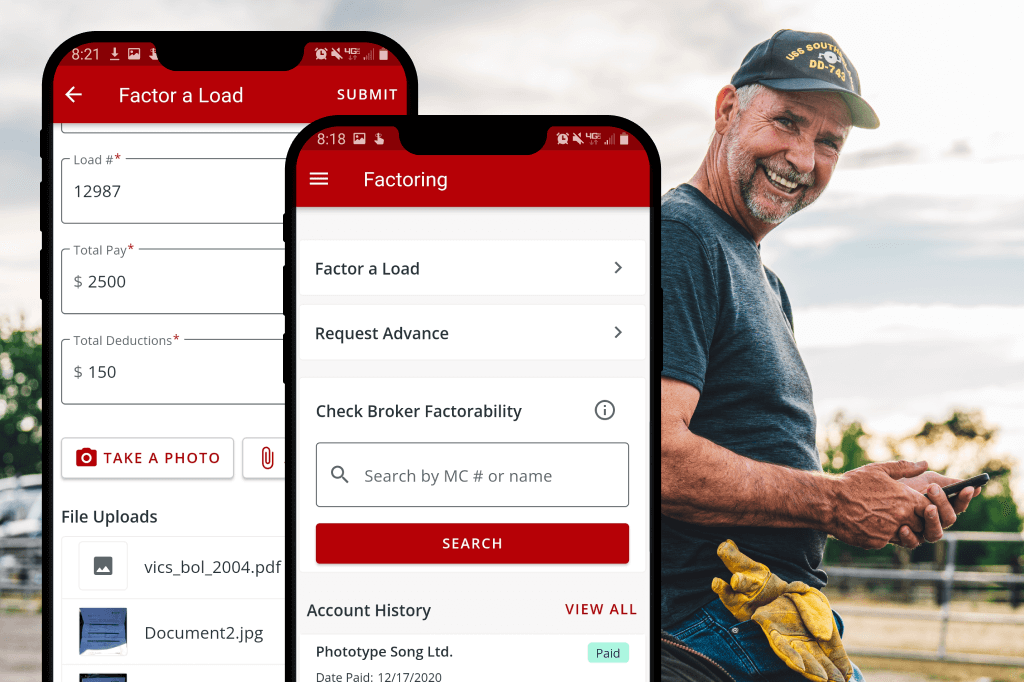How to Switch Freight Factoring Companies (Complete Guide)

Get faster pay with Factoring.
Say goodbye to cash flow worries.
Invoice factoring in the freight industry is a great way for independent owner-operators to ensure a reliable cash flow to keep their trucking business up and running no matter what obstacles come their way. Instead of waiting to get paid from the broker, which could take up to 90 days depending on their pay cycle, the factoring company buys the invoices from the carrier, pays the carrier much more quickly, and then collects the funds from the broker.
But not all factoring companies are alike. They vary widely in terms of how much they charge, the level of service they provide, the terms and conditions they require of you, the types of factoring they offer, and contract duration and flexibility. It’s not uncommon for independent carriers to sign up with a third-party factoring provider only to discover (after it’s too late) that the solution is just not right for what they need and how they operate. The good news is, it’s never too late to change your mind and change companies.
First, let’s go over some common reasons a carrier or owner-operator might want to switch factoring companies. Then, we’ll offer up some guidelines to help you make a switch—and make it as painless as possible.
Common reasons for switching factoring companies
1. Cost
The costs associated with factoring can vary widely from one factoring institution to the next. Some charge interest rates, some charge a flat fee, and some include more services than their competitors, and, therefore, charge more. Also, keep in mind the fine print, and make sure you’re aware of any hidden costs before you compare on cost alone. Surprise cost hits might include wire transfer fees, collection fees, credit check fees, and so on. Factoring companies are well within their rights to charge for “extra” services, but transparency is key. They should always be up front about all potential charges, but it’s up to you to carefully read the contract before you sign on with a factoring company. If cost is the reason you want to make a switch, make sure you are comparing apples to apples and that you uncover any hidden fees.
2. Service
Factoring can be tricky business, and customer service is paramount. Not only should you, the carrier, expect attentive, responsive, and expert help when you have issues, questions, or concerns, but your broker customers should also be treated well. When the factoring company goes to collect funds from your broker, that service should also be stellar: consistently professional and reliable at the very least. If you can’t get anyone to answer service and support calls, if customer service agents are rude or not knowledgeable, or if they aren’t funding your invoices within the promised time frame, you might be ready to shop around for a company that values your business, treats you and your customers with patience respect, and goes the extra mile to meet your needs.
3. Risk Reduction
When you turn over your invoices to a factoring company, you’re trusting them to pay you and collect what they are owed directly from the broker. That’s where the two types of factoring come in—recourse factoring and non-recourse factoring—each with pros and cons.
With recourse factoring, the factoring company’s role is to collect the funds from the broker. But in the event the broker takes too long or, worse, refuses to pay or goes out of business, the responsibility to get paid falls squarely on you. You’ll have to assume the role of debt collector on your own behalf, which means contacting the broker to try and get your money. Lots of phone calls, emails, and frustration later, you still run the risk of never getting paid. And if the factoring company has already paid you but can’t collect from the broker, they can rescind those funds. Recourse factoring costs less than non-recourse, so it’s up to you to determine your level of comfort with this.
For a higher fee (and peace of mind), non-recourse factoring might be the better choice. With non-recourse factoring, the factoring company assumes the risk and takes on the ultimate responsibility of collecting on the invoice. And you get paid no matter what.
Leaving your current factoring company
If you’ve carefully weighed the pros and cons and considered all the different scenarios and factoring offerings, and you’ve decided to leave your current factoring company for a more suitable situation, it can be done. The first thing you need to do is check when your factoring contract ends and determine if you’ll be charged a fee, especially if you’re terminating your contract early. (This is another thing to consider when looking for a new factor company. Do they require lengthy contracts and termination fees that keep you stuck? Look for a company that offers flexibility in case you change your mind.)
If you decide to proceed, give written notice to your current factor company telling them you would like to terminate your contract. Don’t wait! Most companies expect at least a 30-day notice. Check to see if a written notice sent by regular mail is required or if you can handle it with an email.
How to switch factoring companies
- Review your contract with your existing factoring company.
- Select a new factoring company.
- Notify the existing company of your intention to change providers.
- Sign the factoring agreement with your new company.
- Advise your customers of the change.
- Allow plenty of time for the changeover.

The cost of switching factoring companies
If and when you do decide to switch, in most cases the new factoring company will purchase the invoices from the original company. The new company usually pays whatever has already been advanced, plus fees accrued, then collect them from you, the customer, from new invoices you submit to them for factoring. Here’s what a sample contract might look like:
Sample Contract: $50,000 in invoices per month | 2% | Recourse | 12 months | 90% advance rate
No Fees: If you have $50,000 in open invoices, an advance rate of 90 percent and no fees, your buy out should be $45,000. The new factoring provider will pay the old factor $45,000 and instruct your customers to pay them going forward.
Guaranteed or Non-compliance Fees: If you have an agreement to factor $50,000 in invoices per month at 2%, your factoring company is guaranteed $1,000 per month. If you have a 12-month contract, they’re entitled to $12,000 over that period. If you leave after 8 months, you will owe $4,000 in guaranteed fees. This is typically added to your buyout amount.
Early-termination Fees: The old company might charge an early termination fee. If your new factoring company owes the old company $45,000 for your invoices and a $1,000 early-termination fee, the new cost of the buyout is $46,000.
Buyout Fee: The new company might also charge a buyout fee for moving the invoices over. Typically, it’s 1 – 1.5% of the total buyout cost. If your total buyout was $45,000 and the buyout fee is an additional 1%, the cost is $450.
What the buyout looks like
After you’ve given notice to your old factoring company and agreed on a buyout date, the new company should contact them to start the process, which generally goes like this:
- The new provider will verify the current aging report, which shows all open invoices. They will then contact your customers to make sure they received their invoice and get a payment schedule from them.
- The buyout agreement, which details the amount, must be signed by all three parties: the original factoring company, your new factoring provider, and you.
- Once buyout monies are transferred to your new factoring company, the transaction is complete. The new company will terminate the old company’s UCC filing. They will also request a letter from the old company to show your broker customers where to make payments from that point on. Your new company will provide you with a notice of assignment to include on your invoices.

Factor in peace of mind
Before you sign anything, take a look at Truckstop Factoring. Not
only do we take time-consuming paperwork off your plate, once your invoice is
approved, you get paid within 24 hours.
- We offer true non-recourse factoring, meaning if the broker fails to pay, you still get your money.
- Enjoy flat rates as low as 3.25%.
- Always know in advance what your take-home pay is. No hidden fees or surprises.
- Month-to-month terms means you’ll never get stuck in a contract that doesn’t work for you.
- Full-service billing takes the paperwork off your plate.
- No volume requirements. Factor only the loads you want, with no minimums.
FAQs

Find out how our platform gives you the visibility you need to get more done.
Get helpful content delivered to your inbox.
Schedule a demo.
Find out how our platform gives you the visibility you need to get more done.





